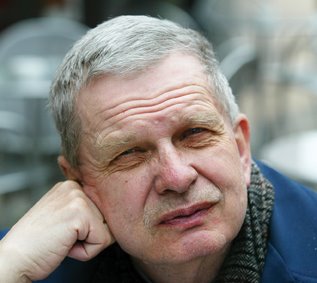Diana Senechal discovered the Book Haven, and we discovered her own blog “on education and other things.” One of those other things was Tomas Venclova, the subject of a recent post on this site. She wrote about her first encounter with the Lithuanian poet’s verse:
It was in 1988 that I first encountered Tomas Venclova’s poetry. I was a senior at Yale; he was directing my independent project on Russian poetry translation. Knowing that he was a poet, I wanted to read his work (but didn’t want to tell him this). So one day I made a furtive trip into the library stacks. I opened up a volume of his poetry and read the lines,
Sustok, sustok. Suyra sakinys.
Stogų riba sutampa su aušra.
Byloja sniegas, pritaria ugnis.
What did these words mean? At the time, it didn’t matter. I was drawn into the sounds, or what I thought were the sounds. “Sustok, sustok. Suyra sakinys.”
(Later, I learned that they meant, roughly, “Stop, stop. The sentence disintegrates. The border of rooftops coincides with the dawn. The snow proclaims, the fire repeats.”)
Tomas later invited her to translate his poems – an honor, certainly. But she has some mixed feelings about the poems she eventually translated for Winter Dialogue. She writes:
“The strength and weakness of my translations was that I tried to preserve the sound, rhythm, and form of the original—or, rather, to recast the poem in comparable sound, rhythm, and form. When it worked, it worked splendidly (for instance, in “Tu, Felix Austria,” “Pestel Street,” and “Autumn in Copenhagen”). When it didn’t, it came across as stilted. I don’t regret taking this approach. I do wish, in retrospect, that I had trained my ear to hear the translations in themselves. I always heard the originals behind the translations.”
 As a teacher, she worries about the lack of quietness in our world, the lack of silence within us. Natalie Gerber made similar observations about her own university students in upstate New York – I quoted her a bit here. Diana Senechal’s proposed solution? The reading, writing and memorization of poetry. Joseph Brodsky would certainly have endorsed her suggestion – we had to memorize hundreds of lines.
As a teacher, she worries about the lack of quietness in our world, the lack of silence within us. Natalie Gerber made similar observations about her own university students in upstate New York – I quoted her a bit here. Diana Senechal’s proposed solution? The reading, writing and memorization of poetry. Joseph Brodsky would certainly have endorsed her suggestion – we had to memorize hundreds of lines.
I was so enthusiastic about her recollections that I immediately downloaded MP3 version of Venclova’s album “Winter Dialogue: Chants from the Holy Land, and shall go to bed listening to the Lithuanian language. After all, Czesław Miłosz said it just might be the language of heaven.
Tags: "joseph brodsky", Czeslaw Milosz, Diana Senechal, Tomas Venclova



October 30th, 2012 at 3:18 pm
[…] I didn’t previously know. So, it was an honor to see that one of my recent pieces had inspired her to listen to a recording of Tomas Venclova reading his own […]